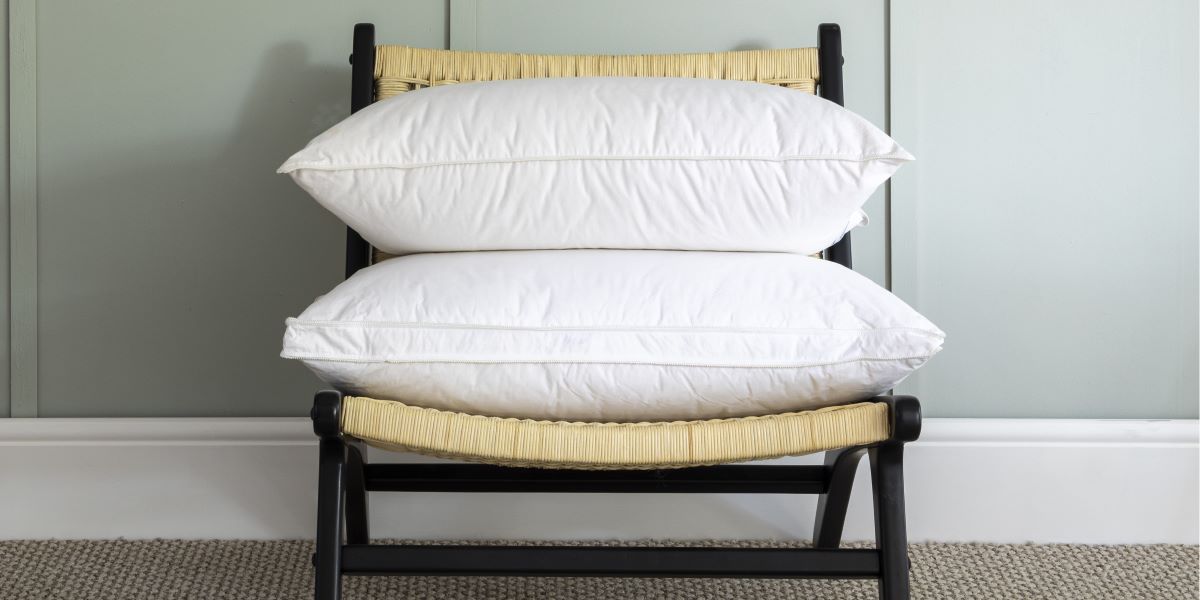The Sleep Council recently revealed that chimps sleep in cleaner beds than humans, and so it is no surprise to find out that we often keep our duvets for far longer than their use-by date. Hidden away under beautiful duvet covers, blankets and bedspreads are often duvets that are lumpy, thin, and downright dirty, yet this bedroom item is not only essential for sleep, but also for our general health.
How often should you change your duvet?
If properly cared for, your duvet can last you for up to 5 years, (and sometimes more depending on the type of duvet and if using a duvet protector). However, there are a few things you can look out for if you unsure if it's time to change your duvet or not, such as warmth, clumping and cleanliness.
So how do you know when it is time to replace your duvet?
Duvets come in many different shapes and sizes. They have various fills from synthetic to natural down and feather, silk or wool. They vary in weight, with different ‘togs’ for different temperature preferences, and they range in quality from the more expensive to the cheaper items you can pick up in your supermarket. However, whatever your duvet, one of the first signs it needs replacing is when it becomes thin and limp.
How warm is your duvet?
If the filling of your duvet is no longer lofty and evenly spread, it can’t trap air in the same way to maintain your body temperature. Staying at the right temperature through the night is one of the most important factors in ensuring you sleep comfortably all night long. If there are cold patches in your duvet you are more likely to wake in the early hours when the ambient temperature drops.

Why does your duvet get clumpy?
Another sign your duvet needs replacing is if the filling has become lumpy. As a duvet ages, its filling can clump together - this can happen with synthetic and natural fillings alike. Shaking your duvet after washing can help prevent this but if it is not possible to separate the lumps, it’s probably time to buy a new one.
A more obvious sign is if your duvet filling is leaking. Higher quality duvets usually come with high thread count covers, which last longer. However, lower quality duvets can come with lower thread count covers and poor stitching which means the fillings can leak after a while. Unfortunately, in this instance, it’s usually pointless trying to repair the duvet because the leaking fill material usually means the duvet cover fabric is losing its strength and the leaking will just continue somewhere else.
How often should you wash your duvet?
Duvets should be regularly washed, with most bedding retailers recommending laundering every few months, or at least twice a year. Duvets should be washed in a regular washing machine, not dry cleaned, although you may need to do this at a launderette if your own washing machine isn’t big enough. Every year we shed approximately a pound (454g) of skin cells into our beds, and every night we lose around half a pint of moisture while sleeping. Along with skin oils, much of this is transferred onto our duvets. After a while it becomes difficult to remove and our duvets start to look less than fresh, and at that stage, it’s almost certainly time for an upgrade.
Dust mites and the allergens they leave behind in their droppings can also be an issue if duvets are not regularly washed. Dust mites eat skin cells shed by people and they thrive in wam, humid environments like beds. They can cause symptoms similar to hayfever such as sneezing and runny noses. Many people with dust mite allergies also experience signs of asthma such as difficulty breathing and wheezing. If you are noticing any of these signs, replacing your duvet (and other bedding items) with hypoallergenic items may help.
How long do duvets last?
The Sleep Council suggests duvets are replaced every two to five years, but it is possible to extend the length of your duvet’s life. Duvet protectors are much easier to wash and can protect your duvet from stains and picking up dust mites. Many are waterproof, breathable and hypoallergenic.
Do duvets lose their warmth?
Having a summer and winter duvet is also a good idea. We know that there is an ideal temperature for sleep, and when environmental temperatures rise or cool, it takes longer to fall asleep and there is more frequent waking and less dreaming. Kicking the wrong tog duvet onto the floor, where it can pick up dirt and dust mites, will do nothing for its longevity, so opting for summer weight, winter weight or all-seasons duvets is a sensible option.
Once you have made the decision to replace your duvet, spend time researching the right choice as getting the correct product can make a significant improvement in the quality of your sleep. And look out for councils or schemes (such as pet charities) that will recycle or reuse your old duvet.
If you’d like to read more about our duvets, then head to our trusty expert piece where we pull out five simple ways to distinguish the two.
See our full range of luxury duvet covers & sets here.





